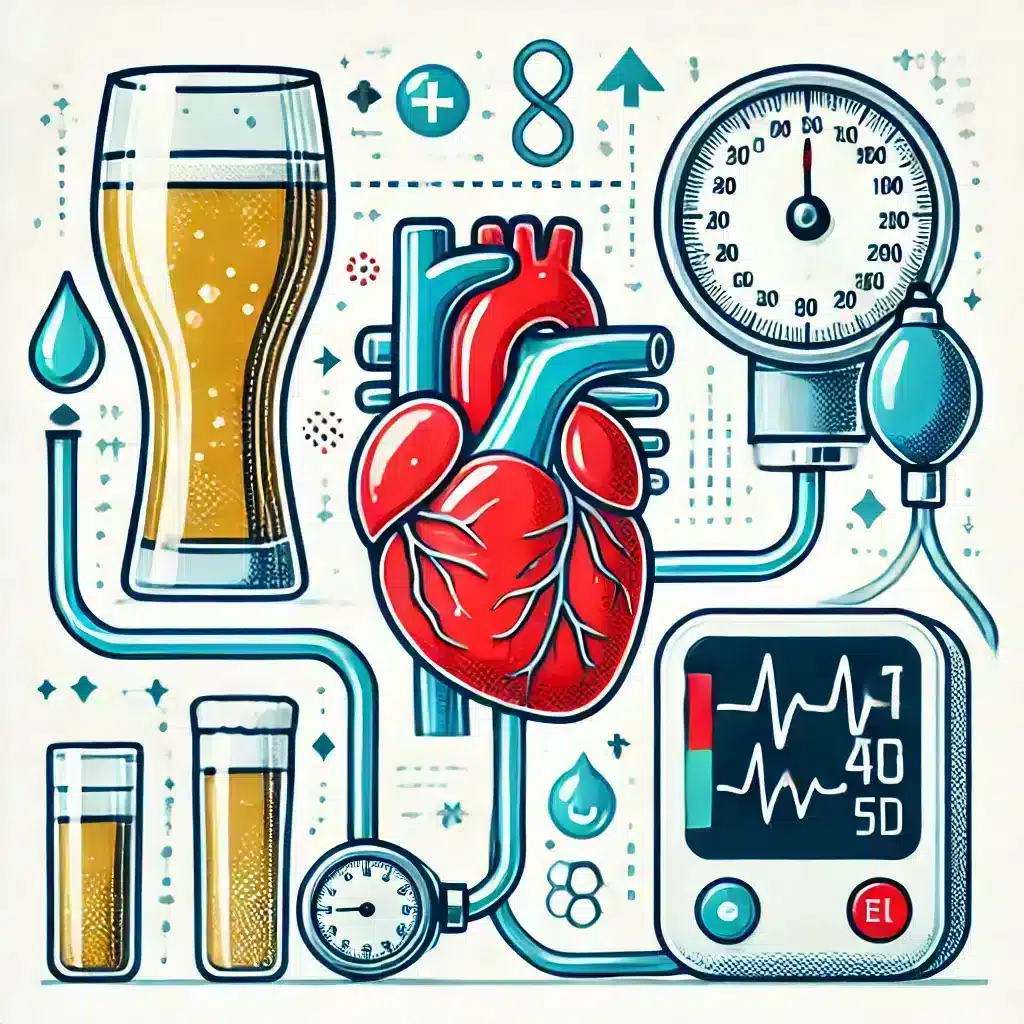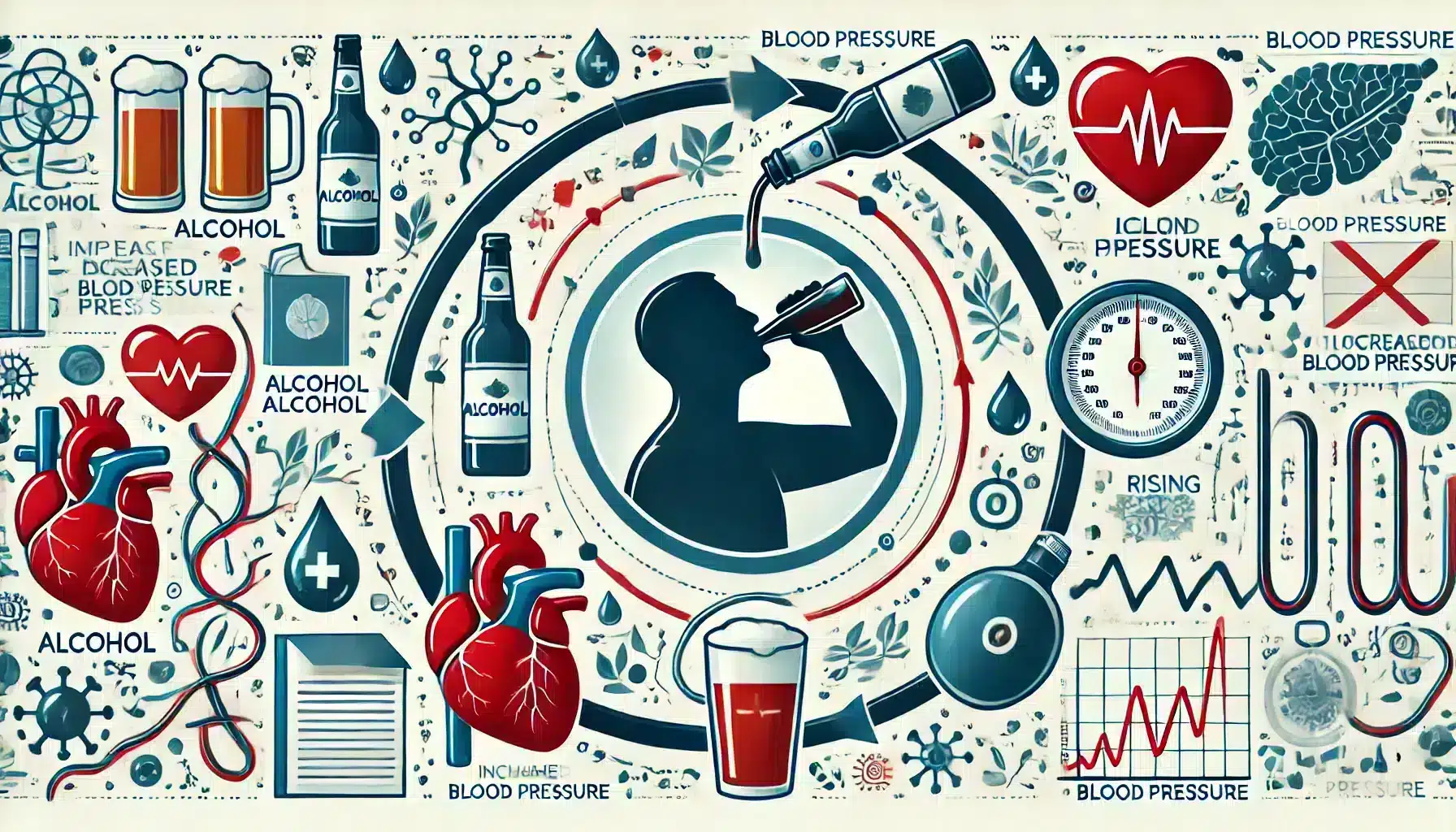How Alcohol Consumption Raises Blood Pressure
The Mechanism: How Alcohol Affects Blood Vessels
Alcohol can cause blood pressure to rise by several mechanisms, one of which involves the constriction of blood vessels. When alcohol is consumed, it triggers the release of stress hormones like adrenaline, which cause blood vessels to constrict. This narrowing of the vessels increases the resistance against blood flow, resulting in elevated blood pressure. Additionally, alcohol impairs the function of the endothelial cells that line the blood vessels, leading to decreased nitric oxide production—a key molecule responsible for vasodilation, or the widening of blood vessels.
Alcohol’s Impact on the Nervous System
Another pathway through which alcohol raises blood pressure is by its impact on the autonomic nervous system. Alcohol consumption stimulates the sympathetic nervous system, which is responsible for the ‘fight or flight’ response. This activation increases heart rate and blood pressure, even in small amounts of alcohol consumption. Over time, frequent stimulation of this system can lead to sustained high blood pressure, a condition known as chronic hypertension.
The Role of Hormones in Alcohol-Induced Hypertension
Hormones play a significant role in regulating blood pressure, and alcohol can disrupt this balance. Alcohol consumption leads to an increase in levels of cortisol, a stress hormone that contributes to higher blood pressure. It also affects the renin-angiotensin-aldosterone system (RAAS), which helps control blood pressure and fluid balance. Disruption of RAAS by alcohol can cause the body to retain more sodium and water, further elevating blood pressure.
Short-term vs. Long-term Effects of Alcohol on Blood Pressure
 Immediate Effects of Alcohol on Blood Pressure
Immediate Effects of Alcohol on Blood Pressure
Alcohol has immediate effects on the cardiovascular system, which can lead to short-term spikes in blood pressure. Within minutes of consumption, alcohol causes vasodilation, or the temporary widening of blood vessels, which initially lowers blood pressure. However, as the body processes alcohol, it can cause an increase in heart rate and blood pressure. This short-term fluctuation can be especially risky for individuals with existing hypertension or heart conditions.
Long-term Consequences: Chronic Alcohol Use and Hypertension
Chronic alcohol consumption can lead to long-term health issues, including sustained high blood pressure. Over time, frequent alcohol intake can cause the body to become less sensitive to its blood pressure-regulating mechanisms, leading to persistent hypertension. This can increase the risk of cardiovascular diseases such as heart attacks, strokes, and heart failure. Additionally, heavy drinking can contribute to the development of other conditions, such as obesity and diabetes, which further elevate blood pressure.
How Regular Drinking Patterns Influence Blood Pressure
Consistent drinking patterns play a crucial role in determining the impact of alcohol on blood pressure. Regular heavy drinking can cause blood pressure to rise over time, while occasional moderate drinking may have less pronounced effects. However, even moderate alcohol use can contribute to hypertension in susceptible individuals. Binge drinking, defined as consuming large amounts of alcohol in a short period, is particularly harmful, as it leads to acute spikes in blood pressure that can damage blood vessels and the heart.
Risk Factors: Who is More Vulnerable to High Blood Pressure from Alcohol?
Genetic Factors: Are You at Higher Risk?
Genetic predisposition plays a significant role in determining how alcohol affects blood pressure. Some individuals have genetic variations that make them more susceptible to the hypertensive effects of alcohol. For instance, genetic differences in alcohol metabolism can affect how quickly alcohol is broken down in the body, influencing blood pressure levels. People with a family history of hypertension or cardiovascular diseases may also be at a higher risk when consuming alcohol regularly.
Age and Gender Differences in Alcohol’s Effects
Age and gender are critical factors in how alcohol impacts blood pressure. Studies suggest that older adults are more likely to experience alcohol-induced hypertension due to age-related changes in blood vessel elasticity and overall cardiovascular health. Men generally have a higher risk of developing high blood pressure from alcohol consumption compared to women, although post-menopausal women also face increased vulnerability due to hormonal changes. It’s important for individuals to consider these factors when assessing their risk.
Underlying Health Conditions That Amplify Risks
Certain underlying health conditions can amplify the risk of high blood pressure from alcohol consumption. Individuals with conditions such as obesity, diabetes, kidney disease, or metabolic syndrome are more likely to experience negative cardiovascular effects from alcohol. Additionally, those with pre-existing hypertension or those who are on blood pressure medications should be particularly cautious, as alcohol can interfere with medication effectiveness and exacerbate hypertension.
Guidelines for Safe Alcohol Consumption
Recommended Alcohol Limits for Men and Women
To minimize the risks associated with alcohol and blood pressure, it’s essential to follow recommended guidelines for alcohol consumption. For men, it’s generally advised to limit intake to no more than two standard drinks per day, while women should limit to one standard drink per day. A standard drink is typically defined as 14 grams of pure alcohol, which is equivalent to a 12-ounce beer, a 5-ounce glass of wine, or 1.5 ounces of distilled spirits. Adhering to these limits can help reduce the risk of hypertension and other alcohol-related health issues.
Understanding Standard Drink Sizes
Understanding what constitutes a standard drink is crucial for managing alcohol intake. Many people underestimate the amount of alcohol they consume because drink sizes vary significantly. A large glass of wine or a mixed drink may contain multiple standard servings of alcohol, leading to unintentional overconsumption. Being aware of these differences can help individuals make more informed choices about their drinking habits, especially when trying to manage blood pressure.
How to Monitor Your Alcohol Intake Effectively
Monitoring alcohol intake is a practical step in managing blood pressure. Keeping a diary of drinks consumed, noting the type, size, and time of consumption, can provide valuable insights into drinking patterns. There are also numerous mobile apps available that can help track alcohol intake, set limits, and provide reminders. For those looking to reduce their intake, these tools can be instrumental in identifying triggers and making healthier decisions in social situations.
What to Do if You Have High Blood Pressure and Drink Alcohol
When to Consult a Healthcare Provider
If you have high blood pressure and consume alcohol, it’s important to regularly consult with a healthcare provider. They can help determine the extent to which alcohol is affecting your blood pressure and provide personalized recommendations for managing both conditions. It’s especially crucial to seek medical advice if you notice consistent elevations in your blood pressure readings after drinking alcohol, or if you are experiencing symptoms such as headaches, dizziness, or chest pain.
Medications and Alcohol: What You Should Know
Many individuals with hypertension are on medications to control their blood pressure, and alcohol can interfere with these treatments. Some blood pressure medications, like beta-blockers and ACE inhibitors, can interact negatively with alcohol, reducing their effectiveness or causing unwanted side effects. It’s important to discuss your alcohol consumption with your healthcare provider, who may adjust your medication plan or provide guidance on safe levels of alcohol intake.
Lifestyle Changes to Support Blood Pressure Management
In addition to moderating alcohol intake, making broader lifestyle changes can significantly help in managing high blood pressure. These changes include maintaining a healthy diet rich in fruits, vegetables, and whole grains, engaging in regular physical activity, managing stress, and avoiding smoking. Reducing sodium intake and maintaining a healthy weight are also crucial. By integrating these habits into your daily routine, you can enhance your overall heart health and reduce the impact of alcohol on your blood pressure.
Tips for Reducing Alcohol Intake
Setting Realistic Goals for Reducing Alcohol
One of the most effective strategies for reducing alcohol intake is to set realistic and achievable goals. Start by assessing your current drinking habits and set small, manageable targets, such as cutting back by one drink per day or designating alcohol-free days each week. Gradual reduction is often more sustainable than abrupt cessation, and setting clear goals can help keep you motivated. Tracking your progress and celebrating small victories can reinforce your commitment to reducing your alcohol intake over time.
Alternatives to Alcohol: Finding Healthier Choices
Finding alternatives to alcohol can help you reduce your consumption while still enjoying social situations. Non-alcoholic beverages, such as sparkling water with a slice of lime, non-alcoholic beer, or mocktails, can be great substitutes. Additionally, exploring hobbies and activities that do not involve alcohol, such as exercise, cooking, or arts and crafts, can provide new ways to relax and socialize without the reliance on drinking. These alternatives not only help lower alcohol intake but also contribute to a healthier lifestyle overall.
Managing Social Situations: How to Say No
Social pressure is a common challenge when trying to reduce alcohol consumption, but learning how to confidently say no is an important skill. Planning ahead for social events by deciding on your drink limits beforehand can help you stay in control. Practice polite but firm responses, such as “I’m taking a break from alcohol,” or “I’m driving tonight,” to avoid unwanted pressure. Surrounding yourself with supportive friends and family who respect your decision can also make it easier to stick to your goals.

